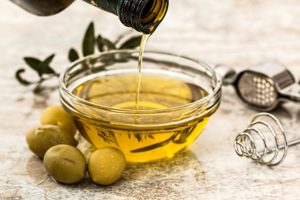
Soybean, canola, palm, and corn oil are examples of vegetable oils extracted from the seeds of those plants that are commonly consumed in the United States.
These oils are suitable for baking due to their neutral flavor profile, but they are also frequently added in large amounts to processed foods like salad dressings, margarine, mayonnaise, and baked goods.
These oils are also known as “refined” oils because manufacturing involves using a chemical solvent to extract the oil from the plant or seed, which is then refined and deodorized to counteract the taste and smell of the chemical solvent. The technology for this type of refinement wasn’t available until the twentieth century.
Other oils are also extracted from plants (think olive oil, coconut oil, etc.). But the term “vegetable oil” has specifically come to encompass plant oils high in omega-6 polyunsaturated fatty acids (PUFAs). So, fats like olive oil and coconut oil don’t fall under these umbrella terms due to the type of fatty acids they contain.
What is the fatty acid profile of seed oils, and how does it differ from other oils?
Fats can either be classified as saturated or unsaturated (mono or polyunsaturated) based on the number of double bonds in their chemical structures. These bonds influence the health effects of the types of fat. Here’s a quick breakdown of the primary type of fat found in commonly consumed oils.
Saturated fats: No double bonds (butter, lard, coconut fat)
Monounsaturated: One double bond (Olive oil, avocados)
Polyunsaturated: Multiple double bonds (fish oil, vegetable oils)
All oils include a mix of these types of fats, however, different varieties vary in the proportion of fat they contain. Seed and vegetable oils typically have the highest levels of polyunsaturated fats (PUFAs).
PUFAs can be split into two categories: omega-6 and omega-3 fatty acids. Both must come from the diet and are therefore termed essential fatty acids. Refined seed oils such as soybean, corn, and safflower oil are considerably high in linoleic acid (LA), the primary dietary omega-6 PUFA.
The impact of omega-6 fatty acids on health
Linoleic Acid (LA) – an omega-6 fatty acid found primarily in vegetable oils as well as in some nuts and seeds – can also be beneficial for heart health when eaten in moderation and in place of saturated fats. High‐quality evidence suggests increasing omega‐6 fat consumption reduces total serum cholesterol slightly in the long term, which can be protective of heart health.
A systematic review of 49 randomized controlled trials found that increasing total PUFA intake may reduce the risk of coronary heart disease and cardiovascular disease events. However, each PUFA is processed differently by the body. Which is why more recent studies have looked at the influence of omega-6s in isolation on risk factors for cardiovascular disease, like inflammation.
Omega-6s from vegetable and seed oils are especially susceptible to oxidation
Because of both the refinement process and the multiple double bonds found in PUFAs, vegetable and seed oils are sensitive to heat, light, and oxygen. When exposed to these elements, PUFAs may go through a process called oxidation – more so than other types of fat or whole food sources of omega-6s like nuts or seeds.
Oxidation of oils leads to:
- Undesirable tastes
- Decomposition of nutritional quality
- The production of harmful compounds like free radicals
Oxidation can occur when oils are sitting on your shelf waiting to be used, or during the cooking process. They can also oxidize and deteriorate within the body, which forms harmful free radicals. An increase in free radicals without an increase in antioxidants – compounds that can neutralize or stop them – leads to oxidative damage of molecules in the body and inflammation. That damage can lead to the production of more free radicals, creating more damage within the body. It’s a vicious cycle.
Low-density lipoproteins (LDL) are especially vulnerable to oxidation because PUFAs comprise their cell walls. LDL transports cholesterol throughout the body, and LDL levels influence the risk for heart health complications.
When dietary PUFAs are consumed from refined seed oils in large quantities, LDL’s sensitivity to oxidation increases, and particles degrade. High levels of oxidized LDL particles are particularly detrimental to heart health. Medical professionals may recommend consuming refined seed oils in moderation in conjunction with increasing the amount of anti-inflammatory fats rich in antioxidants to protect heart health and from excess oxidative damage from occurring.
The relationship between seed oils, inflammation, and heart health
Fatty acids serve different functions in the body. Some are believed to cause inflammation, but others (particularly omega-3s and monounsaturated fats) seem to have anti-inflammatory properties.
Researchers have discovered that when consumed in high amounts, omega-6s from refined seed oils can promote oxidative stress and chronic low-grade inflammation, which can lead to poor heart health outcomes. This is known as “the oxidized linoleic acid hypothesis”.
Though chronic inflammation is a major contributor to heart disease, there are currently no controlled human studies that have analyzed the effects of omega-6 fatty acids on heart disease. It is important to note that there are other characteristics of some dietary patterns that also promote inflammation including high intakes of saturated fat, refined grains, meats, and refined sugars. These diets are also low in many “heart healthy” nutrients that act to reduce bodily inflammation such as fiber, antioxidants, and omega-3 fatty acids. Therefore, looking at ways to improve dietary patterns as a whole can be more beneficial for improving health outcomes.
Despite the concerns raised by the oxidation sensitivity of omega-6 PUFAs in seed oils, larger randomized controlled trials are needed to determine the effects these oils have on heart disease risk factors and other health outcomes.
Contact us if you have any questions about this topic or would like to schedule a consultation.
Live Well Be Well,
Dr. Sage Campione





